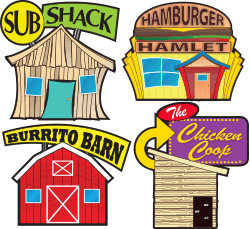

Outbreak!
Dozens of high school juniors and seniors stay home sick or show up at the emergency room and doctors’ offices with similar symptoms. School and medical personnel call the Department of Public Health to report their suspicion that a foodborne outbreak might be happening!
Your Mission:
Hunt for the Contaminating Microbe!

You are assigned to a team of trained professionals who must search for clues throughout the community. What microbe is causing the outbreak? Where were the students infected? What did they eat that caused them to become sick? Who allowed the food to become contaminated?
Your team must work quickly because this information is essential to cure the sick students and prevent others from being infected. Use the light rail, the local bike-sharing program, your feet, and the Internet to move around the board and collect the information you need to answer these questions.
What's Lurking in Lunch?

Your goal is to discover the cause of a foodborne illness outbreak. In order to confirm your suspicions, you will visit the hospital to collect symptom data, eateries to interview employees about their food-handling practices, a microbiology lab to obtain test results, and the Department of Public Health to gather data about food choices and to calculate attack rates.
Download and Assemble Game
Game Rules and Assembly Instructions
• Facilitator's Handbook (PDF)
Player Handbook (PDF)
Game Pieces:
• Game Board (PDF)
• Player Pieces (PDF)
• Outbreak Notepad (PDF)
• Medical Files (PDF)
• Lab Tests Cards (PDF)
• Location Cards (PDF)
• Pathogen Cards (PDF)
• Culprit Cards (PDF)
• Food Attack Rate Cards (PDF)
• Food Reveal Cards (PDF)
Or, download the Game Packet, which includes all Game Pieces listed above.
• Game Packet (PDF)
In addition, you will need a calculator and two six-sided dice (can be purchased at Walgreens® or other pharmacies) to play. Once you've printed and assembled the board, and read the instructions, you are ready to begin! One person will need to play the role of facilitator to set up the clues.

Read more about: What's Lurking in Lunch?
Bibliographic details:
- Article: What's Lurking in Lunch?
- Author(s): Science Center
- Publisher: Arizona State University School of Life Sciences Ask A Biologist
- Site name: ASU - Ask A Biologist
- Date published: 1 Jul, 2014
- Date accessed: 22 May, 2025
- Link: https://askabiologist.asu.edu/whats-lurking-lunch
APA Style
Science Center. (Tue, 07/01/2014 - 12:16). What's Lurking in Lunch?. ASU - Ask A Biologist. Retrieved from https://askabiologist.asu.edu/whats-lurking-lunch
Chicago Manual of Style
Science Center. "What's Lurking in Lunch?". ASU - Ask A Biologist. 01 Jul 2014. https://askabiologist.asu.edu/whats-lurking-lunch
MLA 2017 Style
Science Center. "What's Lurking in Lunch?". ASU - Ask A Biologist. 01 Jul 2014. ASU - Ask A Biologist, Web. https://askabiologist.asu.edu/whats-lurking-lunch
Be Part of
Ask A Biologist
By volunteering, or simply sending us feedback on the site. Scientists, teachers, writers, illustrators, and translators are all important to the program. If you are interested in helping with the website we have a Volunteers page to get the process started.



